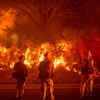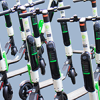The risk of ‘cascading’ natural disasters is on the rise
In a warming world, the dangers from natural disasters are changing. In a recent commentary, we identified a number of costly and deadly catastrophes that point to an increase in the risk of "cascading" events — ones that intensify the impacts of natural hazards and turn them into disasters.








